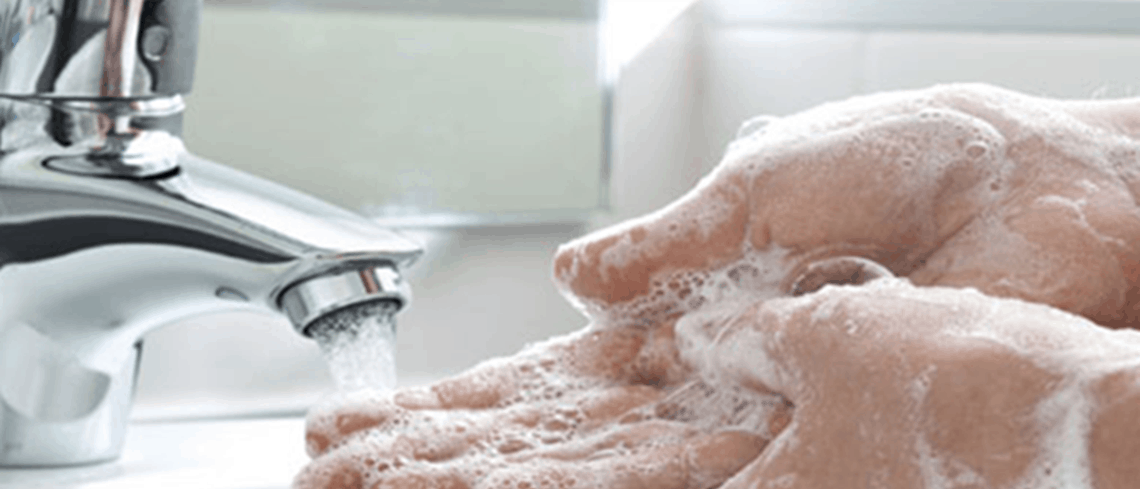HOW TO WASH YOUR HANDS TO PREVENT INFECTIONS
When was the last time you thought about how you washed your hands? Of course, you’ve been doing it all your life – but do you know how to wash your hands properly?
You'll need to take around 20 seconds to a minute, or roughly the time to sing "Happy Birthday" twice, to get them properly clean. You may not want to sing it out loud, but it's a handy reminder to take the time to wash your hands!
Effective hand hygiene can significantly reduce the spread of harmful bacterial and viral infections and other germs that can lead to coronavirus (Covid-19), diarrhea, typhoid, and other diseases.
Read our article to learn the right steps for a proper and effective handwashing experience.
How do germs spreads?
Germs are hiding everywhere, and since we can not see them with the naked eye, they can easily spread anywhere, especially when:
- Touching visibly dirty surfaces and objects
- Changing dirty diapers
- Handling contaminated water and food
- Respiratory droplets are released during a cough or sneeze
- You come into contact with germs and can become infected by touching your eyes, nose, or mouth.
So don't underestimate the power of handwashing! It's one of the best things you can do to help yourself and others.
Don’t forget to see where germs can hide the most so you can better protect yourself by deploying appropriate and effective cleaning and disinfecting measures.
How to wash your hands the right way!
Contaminated hands are largely responsible for spreading diseases within our community, including homes, workplaces, schools, childcare facilities, etc.
But you can prevent that by adopting the following handwashing steps:
- First, wet your hands with clean and running water.
- Then, apply enough antibacterial soap, or antibacterial liquid hand wash to cover all surfaces of your hands and wrists.
- Next, lather and rub your hands together briskly and thoroughly.
- Next, scrub your palm, fingertips, fingernails, and wrists together.
- Continue this process for at least 20 seconds.
- Finally, rub the back of each hand.
- Rinse with clean and running water.
- Finally, dry your hands and wrists with a clean towel, or let them air dry.
When should you wash your hands?
Washing your hands is important when you’re in situations where you’re more likely to acquire or transmit germs. This includes:
After you:
- Cough, sneeze, or blow your nose.
- Touch visibly dirty surfaces or when there’s visible dirt on your hands.
- Shake hands with others.
- Have used the toilet.
- Change diapers or clean bodily waste off others.
- Touch animals, animal feed, or waste.
- Handle pet food or treats.
Before and after:
- Preparing food.
- Consuming foods or drinks.
- Coming into contact with someone with an infectious illness.
- Clean and treat a cut, burn, or wound.
- Take medication, such as pills or eye drops.
- Use public transportation.
- Use your phone or other electronic devices.
- Go to a public place (grocery store, library, parks, etc.)
Use hand sanitizer when you can’t use soap and water
While washing your hands with antibacterial soap, antibacterial liquid hand wash, and water is ideal for getting rid of germs in most situations, what about if they aren’t available?
Well, you should use a hand sanitizer that eliminates 99.9% of germs and bacteria.
Here’s how to use hand sanitizer:
- Apply the hand sanitizer gel to the palm of your hand.
- Rub your hands together.
- Rub the gel over all the surfaces of your hands and fingers until your hands are dry.
FAQs
Do I need to wash my hands for 20 seconds?
According to scientific research, you must scrub for at least 20 seconds to remove harmful germs and bacteria from your hands. Washing for a shorter time doesn’t remove as many germs.
Should I dry my hands using a paper towel or an air dryer?
Both are effective ways to dry your hands. Germs spread more easily when hands are wet, so dry your hands completely by using whichever method you prefer.
Which is better, hand sanitizer or hand washing?
Washing hands with antibacterial soap, antibacterial liquid hand wash, and water are the best way to remove germs from your hands. However, using a hand sanitizer that eliminates 99.9% of germs is also viable if those are unavailable.
